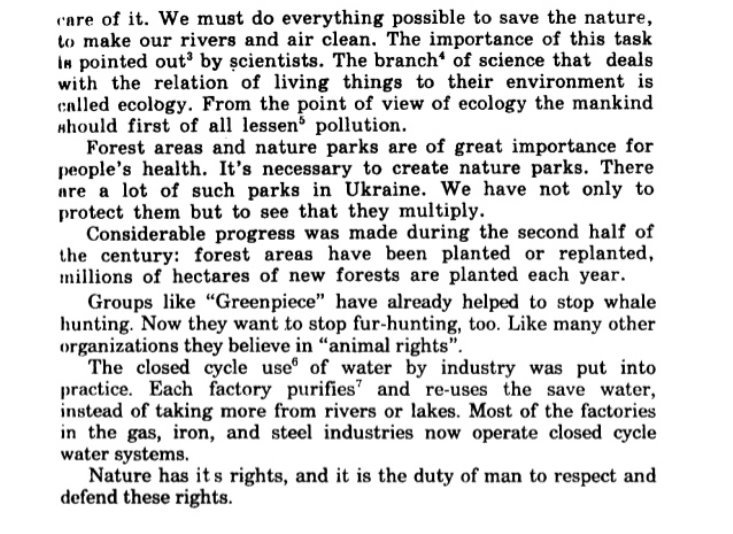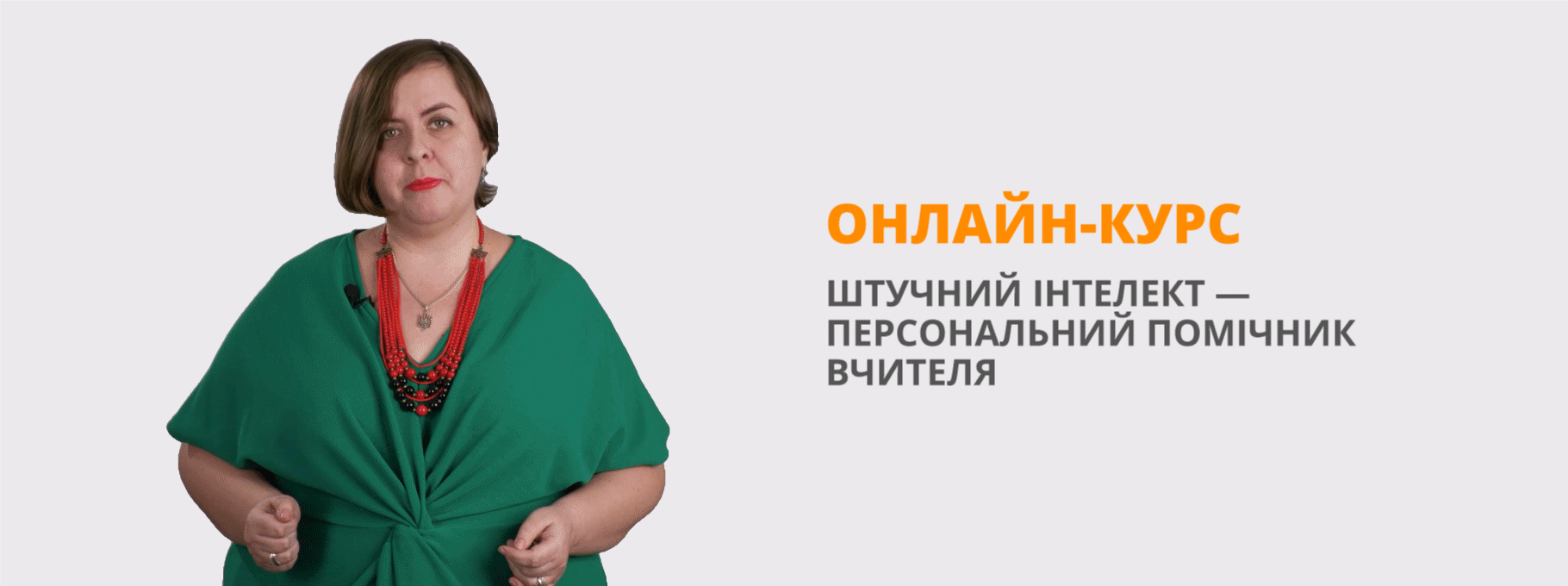Environmental Protection 2
Урок 2.
Мета:
- Навчати непідготовленому усному висловлюванню на базі прочитаного тексту про проблеми охорони довкілля.
- Навчати писати резюме та складати план тексту;
- Розширювати знання учнів про охорону навколишнього середовища;
- Формувати повагу до та любов до природи.
Обладнання:
- Підручник, плакати з цитатами відомих людей про захист довкілля, магнітофон, матеріал для аудіювання “What can you do?” .
ХІД УРОКУ
І. ПІДГОТОВКА ДО СПРИЙНЯТТЯ ІНШОМОВНОГО МОВЛЕННЯ
- Повідомлення теми та мети уроку.
Т: By the end of the lesson you should learn how to work with scientific and popular text, make its plan and summary. This skill will be very helpful for you in future when you have to work with scientific, technical articles and foreign literature.
- Уведення в іншомовну атмосферу.
Активізація знайомих учням ЛО теми «Природа. Довкілля» методом “Eliciting”.
Т: What is environment? Think it over and make a list of five things you suppose relate to environment.
Read your lists out loud and using these ideas, make the Mind-map.
ІІ. ОСНОВНА ЧАСТИНА УРОКУ
- Ознайомлення з цитатами, що відбивають проблему захисту довкілля.
Т: All the progressive humanity is very concerned about the future of our planet. Because the ways of life in many parts of the world have changed. What are these changes caused by?
P1: Changes in the weather and the climate.
P2: Work of large factories and planets.
P3: Nuclear electric power stations.
P4: Cars on the roads of the towns.
P5: Fires in the forests.
P6: Disappearing of different animals and birds.
T: Now, read out loud the following quotations, translate them and say if you agree with these words.
- “The nation that destroys its soil, destroys itself” — these are the words of the American President Franklin Roosevelt.
- “Mother planet is showing us the red warning light — be careful — she is saying. To take care of the planet is to take care of your own house.” (The Dalai Lama)
- “Look after your planet, it’s the only one we have”, — this was the dramatic appeal of Prince Philip of Britain, President of the WWF (World Wildlife Fund).
T: What do you think of it? Is it really our duty to look after our planet? Why?
-
 Пред’явлення тексту для читання
Пред’явлення тексту для читання
 Pre-reading activities. Етап підготовки до читання тексту.
Pre-reading activities. Етап підготовки до читання тексту.
а) Presenting vocabulary.
Т: То be able to speak freely on the topic you should learn and remember a few words and word-combinations.
I’ll convey the meaning of the new words, and you’ll try to guess their meaning, write them down into the vocabularies and give their equivalent in your native tongue.
Everything around you is environment.
To make air, rivers, etc. dirty and dangerous means to pollute.
Dirty and dangerous stuff from cars, factories is pollution.
Stuff is any material, substance or group of things.
To point out means to tell or show something.
To deal with means to look after something and do what is necessary; to tell about something.
Relation is a connection between two things.
To protect means to keep somebody or something safe.
Considerable is great or large.
Pure is not mixed with anything else, clean, (to purify-verb)
To lessen (verb from adjective less).
To recycle means to do smth. to materials like paper or glass so that they can be used again.
To save means: 1) to take smb. or smth. away from danger; 2) to keep smth., especially money, to use later; 3) to use less of smth.
б) Vocabulary Practice.
T: The verb “to save” can be used in different meanings, and you should be able choose what it means from the context.
Translate the sentences of ex. 5 on p. 36 and pay attention to the usage of the verb “to save”.
T: Point out the words formed with suffixes and prefixes and say what part of speech they are, and what are their stems.
Look for some more words with suffixes in the text, guess their meaning, e.g. to replant, to re-use (verbs with prefix “re-”) — садити, використовувати знову; importance — noun with -ance.
While-reading activity. Етап власне читання тексту.
Intensive reading.
T: Give the title to each passage.
Post-reading activity. Навчання переказу.
Writing summary of the text.
T: Point out what the text is about, say it in one sentence. It will be the beginning of your summary.
Make a plan using simple phrases and leaving space for detailed information according to each point.
Give detailed information.
Formulate the main idea of the text.
Thus, what is a summary?
Summary is a short way of telling something by giving only the most important facts. Now, compare your plan and summary with the one given in the book.
- Пред’явлення матеріалу для аудіювання.
Учні прослуховують текст, учитель роздає завдання та пояснює його.
Т: So, you can realize well enough that to save nature and to keep the Earth safe, alive and beautiful for future generations is the duty of mankind, of each person on the planet. Here’s a list of 19 practical ideas. All of them can help the environment.
Try to make an outline of what you’ll hear and put (+) if you do this way, and put (-) if you never do it.
Buy fresh food that doesn’t need a lot of packaging.
Look for and buy “organic” fruit and vegetables from farmers who don’t use chemicals.
Save as much water as possible.
Use products that won’t stay for ever in the earth or sea when you throw them away.
Use bottles more than once.
Try to save paper. (Also, buy and use recycled paper as often as possible.)
Don’t buy products made from rare or protected species.
Try to eat a healthier diet. Avoid too much fat or sugar.
Don’t buy hamburgers or pizzas in plastic boxes which contain CFCs1.
Use public transport.
Make sure that your family and friends use unleaded (not containing a dangerous metal lead) petrol in their cars.
Look for aerosols which haven’t got any CFC in them.
Use batteries (giving electricity) as little as possible. It takes 50 times more energy to make them than they produce.
Don’t leave on electric lights, TV, if you’re not using them.
Help old people in your area to insulate their homes (to protect against cold and wet weather). This saves energy.
Find out more about Green organizations in your area.
Write letters to the government in your country about Green problems which worry you.
Try to throw away at least 25 % less rubbish.
Find out more about nature in your area. Are there any woods, fields, etc. in danger?
Finally, make a conclusion how environmentally aware you are (to be aware of smth. means to know about it). Try to realize whether you do enough to help the environment.
ІІІ. ЗАКЛЮЧНА ЧАСТИНА УРОКУ
- Домашнє завдання.
Т: Practise writing a summary of the article ex. 6, p. 36.
- Підбиття підсумків уроку.
T: Which problem is considered to be one of the most global?
Ps: Ecological situation.
T: What is ecology?
Ps: Literally the word “ecology” means “a study of home”.
T: Is it possible do you think to solve the ecological problems?
What can personally you do to keep the environment clean?


про публікацію авторської розробки
Додати розробку
